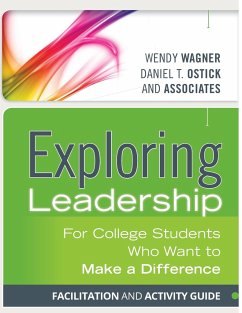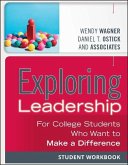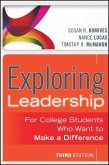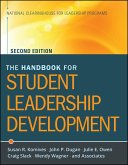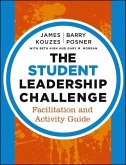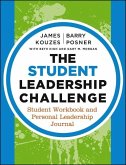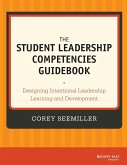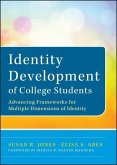Wendy Wagner, Daniel T. Ostick
Exploring Leadership
For College Students Who Want to Make a Difference, Facilitation and Activity Guide
Wendy Wagner, Daniel T. Ostick
Exploring Leadership
For College Students Who Want to Make a Difference, Facilitation and Activity Guide
- Broschiertes Buch
- Merkliste
- Auf die Merkliste
- Bewerten Bewerten
- Teilen
- Produkt teilen
- Produkterinnerung
- Produkterinnerung
Teach Leadership Well
This guide provides facilitation modules for the topics in Exploring Leadership, Third Edi tion, chapter by chap ter. It includes the best lesson plans and activities from practicing leadership educators who have used Exploring Leadership for years, as well as sample syllabi for using the book as a text and shaping a weekly schedule around the assigned chapters, or using the content in cocurricular activities, such as retreats and workshops.
Andere Kunden interessierten sich auch für
![Exploring Leadership Exploring Leadership]() Wendy WagnerExploring Leadership21,99 €
Wendy WagnerExploring Leadership21,99 €![Exploring Leadership with Access Code Exploring Leadership with Access Code]() Susan R. KomivesExploring Leadership with Access Code75,99 €
Susan R. KomivesExploring Leadership with Access Code75,99 €![The Handbook for Student Leadership Development The Handbook for Student Leadership Development]() Susan R. KomivesThe Handbook for Student Leadership Development64,99 €
Susan R. KomivesThe Handbook for Student Leadership Development64,99 €![The Student Leadership Challenge The Student Leadership Challenge]() James M. KouzesThe Student Leadership Challenge65,99 €
James M. KouzesThe Student Leadership Challenge65,99 €![The Student Leadership Challenge The Student Leadership Challenge]() James M. KouzesThe Student Leadership Challenge25,99 €
James M. KouzesThe Student Leadership Challenge25,99 €![Student Leadership Competencies Guidebk Student Leadership Competencies Guidebk]() Corey SeemillerStudent Leadership Competencies Guidebk46,99 €
Corey SeemillerStudent Leadership Competencies Guidebk46,99 €![Identity Development of College Students Identity Development of College Students]() Susan R. JonesIdentity Development of College Students54,99 €
Susan R. JonesIdentity Development of College Students54,99 €-
-
-
Teach Leadership Well
This guide provides facilitation modules for the topics in Exploring Leadership, Third Edi tion, chapter by chap ter. It includes the best lesson plans and activities from practicing leadership educators who have used Exploring Leadership for years, as well as sample syllabi for using the book as a text and shaping a weekly schedule around the assigned chapters, or using the content in cocurricular activities, such as retreats and workshops.
Hinweis: Dieser Artikel kann nur an eine deutsche Lieferadresse ausgeliefert werden.
This guide provides facilitation modules for the topics in Exploring Leadership, Third Edi tion, chapter by chap ter. It includes the best lesson plans and activities from practicing leadership educators who have used Exploring Leadership for years, as well as sample syllabi for using the book as a text and shaping a weekly schedule around the assigned chapters, or using the content in cocurricular activities, such as retreats and workshops.
Hinweis: Dieser Artikel kann nur an eine deutsche Lieferadresse ausgeliefert werden.
Produktdetails
- Produktdetails
- Verlag: Wiley & Sons
- Artikelnr. des Verlages: 1W118399490
- 3. Aufl.
- Seitenzahl: 304
- Erscheinungstermin: 6. Mai 2013
- Englisch
- Abmessung: 280mm x 216mm x 16mm
- Gewicht: 755g
- ISBN-13: 9781118399491
- ISBN-10: 1118399498
- Artikelnr.: 36898518
- Herstellerkennzeichnung
- Libri GmbH
- Europaallee 1
- 36244 Bad Hersfeld
- gpsr@libri.de
- Verlag: Wiley & Sons
- Artikelnr. des Verlages: 1W118399490
- 3. Aufl.
- Seitenzahl: 304
- Erscheinungstermin: 6. Mai 2013
- Englisch
- Abmessung: 280mm x 216mm x 16mm
- Gewicht: 755g
- ISBN-13: 9781118399491
- ISBN-10: 1118399498
- Artikelnr.: 36898518
- Herstellerkennzeichnung
- Libri GmbH
- Europaallee 1
- 36244 Bad Hersfeld
- gpsr@libri.de
Wendy Wagner is the former coordinator of the National Clearinghouse for Leadership Programs. She is the coauthor of the Handbook for Student Leadership Development, Second Edition and Leadership for a Better World, both published by Jossey-Bass. Daniel T. Ostick is the coordinator for leadership curriculum development and academic partnerships for the Adele H. Stamp Student Union ? Center for Campus Life at the University of Maryland. He is a chapter author in the Handbook for Student Leadership Development, Second Edition and a contributor to Leadership for a Better World.
About the Authors ix Introduction xi Teaching Leadership xiii Leadership Identity Development xxi Module 1a
Introduction to Leadership Laura Osteen
Florida State University 1 Module 1b
Exploring the Meaning of Leader and Follower Aaron Asmundson
University of Minnesota 8 Module 2a
What Is Leadership? Myths
Truths
and Definitions Kristan Cilente Skendall
University of Maryland
College Park 15 Module 2b
Generations of Leadership Theory Michelle L. Kusel
Loyola University Chicago 20 Module 2c
Emerging Leadership Theory Wendy Wagner
George Mason University 24 Module 3a
The Relational Leadership Model Sean Gehrke
University of Southern California 31 Module 3b
Being Purposeful Paul Stonecipher
Florida State University 41 Module 3c
Being Inclusive Tom Segar
Shepherd University 47 Module 3d
Being Empowering Steve Mills
Florida State University 53 Module 3e
Being Ethical David Rosch and Kirstin Phelps
University of Illinois at Urbana-Champaign 59 Module 3f
Being Process Oriented Chris Bohle
Hope College 68 Module 4a
Exploring Strengths Katherine Hershey Conlon
University of Maryland
College Park 74 Module 4b
Self-Awareness: Strengths
Values
and Beliefs Sunshine Workman
University of California
Berkeley 80 Module 4c
Leadership Skills Assessment William Smedick
Johns Hopkins University 86 Module 5a
Developing a Multicultural Mindset Mark Anthony Torrez
Emory University 95 Module 5b
Gender Influences on Leadership Paige Haber-Curran
Texas State University-San Marcos 100 Module 5c
Cultural Influences on Leadership Stephanie H. Chang
University of Maryland
College Park 110 Module 5d
Leadership and Communication Kathryn A. Sturtevant
Texas A&M University 118 Module 6a
Creating and Sustaining an Ethical Organizational Environment Wendy Wagner
George Mason University 124 Module 6b
Assumptions About Ethical Leadership Daniel Ostick
University of Maryland
College Park 130 Module 6c
Ethical Decision Making Nick Lennon
George Mason University 137 Module 7a
What Is Community and Why Is It Important? Kathleen Callahan
Florida State University 146 Module 7b
Community Building Laura McMaster
East Carolina University 154 Module 8a
Understanding Groups and Group Development Melissa Shehane
Texas A&M University 161 Module 8b
Group Dynamics and Group Roles Eric Kaufman
Virginia Tech University 166 Module 8c
Creative Conflict in Groups Daniel Tillapaugh
University of Maine 173 Module 8d
Group Decision Making Daniel Ostick
University of Maryland
College Park 183 Module 8e
Roles in Teams and Groups Meredith A. Smith and Tyler L. McClain
Fairfield University 191 Module 9a
Understanding Complex Organizations Dave Dessauer
University of Maryland
College Park 202 Module 9b
Organizational Culture Kerry Priest
Kansas State University 207 Module 10a
Understanding Individual Change Jillian Volpe White
Florida State University 213 Module 10b
Facilitating Change in Organizations Sarah Edwards
Texas A&M University 218 Module 11a
Social Change Model of Leadership Development Antron Mahoney
Florida State University 224 Module 11b
Building Coalitions for Collective Action Wendy Wagner
George Mason University 229 Module 11c
From Service to Civic Engagement Jennifer M. Pigza
Saint Mary's College of California 235 Module 11d
Identifying Critical Issues: Finding Your Passion Josh Hiscock
The George Washington University 242 Module 11e
Appreciative Inquiry Julie Owen
George Mason University 248 Module 12a
Well-Being Stacey Guenther
George Mason University 255 Module 12b
Renewal Stacey Guenther
George Mason University 262
Introduction to Leadership Laura Osteen
Florida State University 1 Module 1b
Exploring the Meaning of Leader and Follower Aaron Asmundson
University of Minnesota 8 Module 2a
What Is Leadership? Myths
Truths
and Definitions Kristan Cilente Skendall
University of Maryland
College Park 15 Module 2b
Generations of Leadership Theory Michelle L. Kusel
Loyola University Chicago 20 Module 2c
Emerging Leadership Theory Wendy Wagner
George Mason University 24 Module 3a
The Relational Leadership Model Sean Gehrke
University of Southern California 31 Module 3b
Being Purposeful Paul Stonecipher
Florida State University 41 Module 3c
Being Inclusive Tom Segar
Shepherd University 47 Module 3d
Being Empowering Steve Mills
Florida State University 53 Module 3e
Being Ethical David Rosch and Kirstin Phelps
University of Illinois at Urbana-Champaign 59 Module 3f
Being Process Oriented Chris Bohle
Hope College 68 Module 4a
Exploring Strengths Katherine Hershey Conlon
University of Maryland
College Park 74 Module 4b
Self-Awareness: Strengths
Values
and Beliefs Sunshine Workman
University of California
Berkeley 80 Module 4c
Leadership Skills Assessment William Smedick
Johns Hopkins University 86 Module 5a
Developing a Multicultural Mindset Mark Anthony Torrez
Emory University 95 Module 5b
Gender Influences on Leadership Paige Haber-Curran
Texas State University-San Marcos 100 Module 5c
Cultural Influences on Leadership Stephanie H. Chang
University of Maryland
College Park 110 Module 5d
Leadership and Communication Kathryn A. Sturtevant
Texas A&M University 118 Module 6a
Creating and Sustaining an Ethical Organizational Environment Wendy Wagner
George Mason University 124 Module 6b
Assumptions About Ethical Leadership Daniel Ostick
University of Maryland
College Park 130 Module 6c
Ethical Decision Making Nick Lennon
George Mason University 137 Module 7a
What Is Community and Why Is It Important? Kathleen Callahan
Florida State University 146 Module 7b
Community Building Laura McMaster
East Carolina University 154 Module 8a
Understanding Groups and Group Development Melissa Shehane
Texas A&M University 161 Module 8b
Group Dynamics and Group Roles Eric Kaufman
Virginia Tech University 166 Module 8c
Creative Conflict in Groups Daniel Tillapaugh
University of Maine 173 Module 8d
Group Decision Making Daniel Ostick
University of Maryland
College Park 183 Module 8e
Roles in Teams and Groups Meredith A. Smith and Tyler L. McClain
Fairfield University 191 Module 9a
Understanding Complex Organizations Dave Dessauer
University of Maryland
College Park 202 Module 9b
Organizational Culture Kerry Priest
Kansas State University 207 Module 10a
Understanding Individual Change Jillian Volpe White
Florida State University 213 Module 10b
Facilitating Change in Organizations Sarah Edwards
Texas A&M University 218 Module 11a
Social Change Model of Leadership Development Antron Mahoney
Florida State University 224 Module 11b
Building Coalitions for Collective Action Wendy Wagner
George Mason University 229 Module 11c
From Service to Civic Engagement Jennifer M. Pigza
Saint Mary's College of California 235 Module 11d
Identifying Critical Issues: Finding Your Passion Josh Hiscock
The George Washington University 242 Module 11e
Appreciative Inquiry Julie Owen
George Mason University 248 Module 12a
Well-Being Stacey Guenther
George Mason University 255 Module 12b
Renewal Stacey Guenther
George Mason University 262
About the Authors ix Introduction xi Teaching Leadership xiii Leadership Identity Development xxi Module 1a
Introduction to Leadership Laura Osteen
Florida State University 1 Module 1b
Exploring the Meaning of Leader and Follower Aaron Asmundson
University of Minnesota 8 Module 2a
What Is Leadership? Myths
Truths
and Definitions Kristan Cilente Skendall
University of Maryland
College Park 15 Module 2b
Generations of Leadership Theory Michelle L. Kusel
Loyola University Chicago 20 Module 2c
Emerging Leadership Theory Wendy Wagner
George Mason University 24 Module 3a
The Relational Leadership Model Sean Gehrke
University of Southern California 31 Module 3b
Being Purposeful Paul Stonecipher
Florida State University 41 Module 3c
Being Inclusive Tom Segar
Shepherd University 47 Module 3d
Being Empowering Steve Mills
Florida State University 53 Module 3e
Being Ethical David Rosch and Kirstin Phelps
University of Illinois at Urbana-Champaign 59 Module 3f
Being Process Oriented Chris Bohle
Hope College 68 Module 4a
Exploring Strengths Katherine Hershey Conlon
University of Maryland
College Park 74 Module 4b
Self-Awareness: Strengths
Values
and Beliefs Sunshine Workman
University of California
Berkeley 80 Module 4c
Leadership Skills Assessment William Smedick
Johns Hopkins University 86 Module 5a
Developing a Multicultural Mindset Mark Anthony Torrez
Emory University 95 Module 5b
Gender Influences on Leadership Paige Haber-Curran
Texas State University-San Marcos 100 Module 5c
Cultural Influences on Leadership Stephanie H. Chang
University of Maryland
College Park 110 Module 5d
Leadership and Communication Kathryn A. Sturtevant
Texas A&M University 118 Module 6a
Creating and Sustaining an Ethical Organizational Environment Wendy Wagner
George Mason University 124 Module 6b
Assumptions About Ethical Leadership Daniel Ostick
University of Maryland
College Park 130 Module 6c
Ethical Decision Making Nick Lennon
George Mason University 137 Module 7a
What Is Community and Why Is It Important? Kathleen Callahan
Florida State University 146 Module 7b
Community Building Laura McMaster
East Carolina University 154 Module 8a
Understanding Groups and Group Development Melissa Shehane
Texas A&M University 161 Module 8b
Group Dynamics and Group Roles Eric Kaufman
Virginia Tech University 166 Module 8c
Creative Conflict in Groups Daniel Tillapaugh
University of Maine 173 Module 8d
Group Decision Making Daniel Ostick
University of Maryland
College Park 183 Module 8e
Roles in Teams and Groups Meredith A. Smith and Tyler L. McClain
Fairfield University 191 Module 9a
Understanding Complex Organizations Dave Dessauer
University of Maryland
College Park 202 Module 9b
Organizational Culture Kerry Priest
Kansas State University 207 Module 10a
Understanding Individual Change Jillian Volpe White
Florida State University 213 Module 10b
Facilitating Change in Organizations Sarah Edwards
Texas A&M University 218 Module 11a
Social Change Model of Leadership Development Antron Mahoney
Florida State University 224 Module 11b
Building Coalitions for Collective Action Wendy Wagner
George Mason University 229 Module 11c
From Service to Civic Engagement Jennifer M. Pigza
Saint Mary's College of California 235 Module 11d
Identifying Critical Issues: Finding Your Passion Josh Hiscock
The George Washington University 242 Module 11e
Appreciative Inquiry Julie Owen
George Mason University 248 Module 12a
Well-Being Stacey Guenther
George Mason University 255 Module 12b
Renewal Stacey Guenther
George Mason University 262
Introduction to Leadership Laura Osteen
Florida State University 1 Module 1b
Exploring the Meaning of Leader and Follower Aaron Asmundson
University of Minnesota 8 Module 2a
What Is Leadership? Myths
Truths
and Definitions Kristan Cilente Skendall
University of Maryland
College Park 15 Module 2b
Generations of Leadership Theory Michelle L. Kusel
Loyola University Chicago 20 Module 2c
Emerging Leadership Theory Wendy Wagner
George Mason University 24 Module 3a
The Relational Leadership Model Sean Gehrke
University of Southern California 31 Module 3b
Being Purposeful Paul Stonecipher
Florida State University 41 Module 3c
Being Inclusive Tom Segar
Shepherd University 47 Module 3d
Being Empowering Steve Mills
Florida State University 53 Module 3e
Being Ethical David Rosch and Kirstin Phelps
University of Illinois at Urbana-Champaign 59 Module 3f
Being Process Oriented Chris Bohle
Hope College 68 Module 4a
Exploring Strengths Katherine Hershey Conlon
University of Maryland
College Park 74 Module 4b
Self-Awareness: Strengths
Values
and Beliefs Sunshine Workman
University of California
Berkeley 80 Module 4c
Leadership Skills Assessment William Smedick
Johns Hopkins University 86 Module 5a
Developing a Multicultural Mindset Mark Anthony Torrez
Emory University 95 Module 5b
Gender Influences on Leadership Paige Haber-Curran
Texas State University-San Marcos 100 Module 5c
Cultural Influences on Leadership Stephanie H. Chang
University of Maryland
College Park 110 Module 5d
Leadership and Communication Kathryn A. Sturtevant
Texas A&M University 118 Module 6a
Creating and Sustaining an Ethical Organizational Environment Wendy Wagner
George Mason University 124 Module 6b
Assumptions About Ethical Leadership Daniel Ostick
University of Maryland
College Park 130 Module 6c
Ethical Decision Making Nick Lennon
George Mason University 137 Module 7a
What Is Community and Why Is It Important? Kathleen Callahan
Florida State University 146 Module 7b
Community Building Laura McMaster
East Carolina University 154 Module 8a
Understanding Groups and Group Development Melissa Shehane
Texas A&M University 161 Module 8b
Group Dynamics and Group Roles Eric Kaufman
Virginia Tech University 166 Module 8c
Creative Conflict in Groups Daniel Tillapaugh
University of Maine 173 Module 8d
Group Decision Making Daniel Ostick
University of Maryland
College Park 183 Module 8e
Roles in Teams and Groups Meredith A. Smith and Tyler L. McClain
Fairfield University 191 Module 9a
Understanding Complex Organizations Dave Dessauer
University of Maryland
College Park 202 Module 9b
Organizational Culture Kerry Priest
Kansas State University 207 Module 10a
Understanding Individual Change Jillian Volpe White
Florida State University 213 Module 10b
Facilitating Change in Organizations Sarah Edwards
Texas A&M University 218 Module 11a
Social Change Model of Leadership Development Antron Mahoney
Florida State University 224 Module 11b
Building Coalitions for Collective Action Wendy Wagner
George Mason University 229 Module 11c
From Service to Civic Engagement Jennifer M. Pigza
Saint Mary's College of California 235 Module 11d
Identifying Critical Issues: Finding Your Passion Josh Hiscock
The George Washington University 242 Module 11e
Appreciative Inquiry Julie Owen
George Mason University 248 Module 12a
Well-Being Stacey Guenther
George Mason University 255 Module 12b
Renewal Stacey Guenther
George Mason University 262

